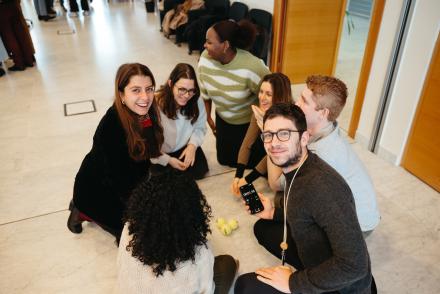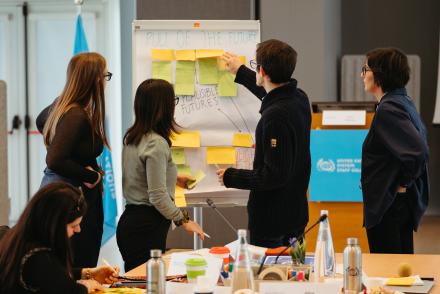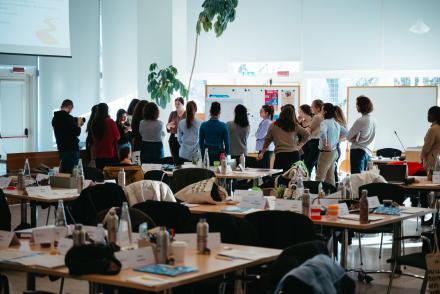
From induction to impact: Equipping young professionals at the UN
“Alone, we can do so little; together, we can do so much.” – Helen Keller
Helen Keller's words resonate deeply in the context of the United Nations and other multilateral organizations, where progress is rarely achieved in isolation. Success is not just about individual effort, it is about collaboration, knowledge-sharing, and building and maintaining meaningful professional relationships. This is a key focus of the Junior Professional Officers (JPO) Orientation Programme, delivered by UNSSC in partnership with UN DESA and member states equipping young professionals not only with critical UN knowledge but also peer-to-peer learning, the networks and skills necessary to thrive in their roles as JPOs and beyond. Peer communities of practice enable JPOs to share their experiences and develop solutions to common challenges. Building developmental relationships sustains growth beyond any single training.
Since its inception in 2003, the JPO Orientation Programme by UNSSC has been designed as the only system-wide induction to prepare young professionals for their roles within the UN system and other multilateral organizations. Offering core curriculum is critical for ensuring incoming JPOs build strong foundations of UN system knowledge and build the critical skills that would allow them to operate effectively in their roles. This induction programme creates consistencies in preparedness across JPOs irrespective of which country sponsors them and equips JPOs with the baseline capabilities required for early productivity. It importantly fosters sharing best practices, experiences, mutual support and drives community building and immersion among global JPOs.
Drawing on the wealth of knowledge and experience within the represented international institutions, this induction programme helps JPOs land in their JPO assignments and develop the skills and insights they need to make meaningful contributions to the diverse mandates of the agencies and organizations they join. JPOs bring outside perspectives, new capabilities and energy that can positively contribute to the UN’s transformation. Providing JPOs platforms to contribute solutions and influence change is a way of recognizing their potential as change agents. fosters sharing best practices, experiences, mutual support and drives community building and immersion.
Strengthening connections in a changing multilateral context
The Global Edition of the JPO Orientation Programme took place across two editions—in October 2024 and January 2025—bringing together 108 JPOs sponsored by 9 member states, Australia, Belgium, Finland, France, Luxembourg, Spain, Switzerland, the United States of America, and Italy. The latest editions of the programme occurred within a challenging multilateral context, where international cooperation is more important than ever. Strengthening connections and relationships across the UN system and other international organizations is not just beneficial; it is essential to tackling global issues effectively when they are most at stake now.
Given this evolving context, the only inter-agency system-wide JPO orientation programme has become even more crucial in onboarding young professionals with essential knowledge, competencies, and leadership skills. It serves as a bridge for new talent to integrate into the UN system and other multilateral organizations while fostering collaboration, adaptability, and resilience. Through peer-to-peer networking opportunities, JPOs not only gain insight into the workings of these institutions but also form lasting professional relationships that shape their careers and leadership potential.

Building networks and relationships: How the programme facilitates connection
Networking is a vital component of the JPO Orientation Programme, intentionally embedded throughout the programme’s instructional design. Through a variety of structured activities, JPOs were encouraged to connect, collaborate, and establish relationships that will support them throughout their assignment and careers. Some of these activities included:
-
LEGO Serious Play (TM): This experiential, playful methodology allowed participants to reflect on their roles, values, and the broader system, both as individuals and as part of a collective. By visually and physically constructing their ideas, JPOs deepened their understanding of how they fit into the larger international framework and how their work interconnects with their peers.
-
Inside and Beyond the Training Room: Networking was integrated into the methodology of formal sessions but also extended beyond them through carefully curated experiences, including team building with “One Beat,” a guided musical experience where JPOs collaborated as a team to create rhythmic orchestral pieces using musical instruments, the city tour and networking social gatherings. These informal settings and spaces provided JPOs with opportunities to build relationships in a relaxed environment, creating emotional connection and collaboration with each other, fostering a sense of camaraderie and trust.
-
Focused Action Planning: To ensure long-term impact, the programme featured a session dedicated to planning the JPOs' first 100 days in their roles. This structured approach helped them set clear goals, identify key contacts, and strategize their contributions within their respective organizations and bounce back ideas with each other.
-
Final-Day Analytic Process: Sailboat Analysis: In a critical closing session, participants identified what they wanted from their group going forward. Through the Sailboat Analysis method, they identified potential opportunities, crafting specific plans to sustain their professional networks.
-
Reunion webinars: A few months after the programme, JPOs reconnected through a dedicated webinar, where they shared their successes, reflected on their experiences as JPOs, and reinforced these important professional connections.

The lasting impact of networking in multilateral organizations
The connections forged during the JPO Orientation Programme are not just beneficial in the short term; they lay the foundation for a lifetime of professional collaboration. Many JPOs have testified to the profound impact of these relationships already, noting how their networks have project collaborations, and knowledge-sharing across their organizations. For example, one participant in the training facilitated a connection that enabled another participant to successfully develop and launch a women's self-defense program in collaboration with an international partner.
This spirit of engagement and mutual support begins during oreintation, with participants experiencing its impact immediately upon completing the training, as exemplified by the following quote (s):
“I think the most powerful take home is to approach my new UN career with a growth mindset and with a strong mental focus. It's easy to fall in the trap of habits and be overwhelmed with day-to-day tasks. Driving my UN journey, keeping awareness of the context will be a winning mindset, and the network and skills we built will also be key assets”
“The programme was fun and engaging, which is essential to absorbing any information. What I liked most about the course was taking the time to get to know the other JPOs in the system and build a community.”
“The different learning and networking opportunities, the learning by playing, the group work to process notions, the possibility to learn one from the other on topics of preference and relevance during breaks. I liked the fact that we got exposed to different groups and people everyday.”

By including these unique approaches such as LEGO Serious Play, immersive team-building exercises, and structured planning sessions, the programme ensures that networking is not just an afterthought but a central pillar of the experience. These innovative approaches contribute to problem-solving, leadership development, and a stronger sense of belonging within the multilateral system.
Looking ahead
As the next edition of the JPO Induction Programme approaches in the Fall 2025, its role in preparing young professionals for the UN and other multilateral organizations remains more critical than ever. Focused on inter-agency UN onboarding knowledge, inclusive leadership, strategic thinking, and essential relationships, the programme aligns with the UN 2.0 vision of a more agile, innovative, and connected international workforce.
The potential impact of these meaningful networks cannot be overstated. As JPOs continue their assignments, the relationships they have built will be vital for driving collective action, supporting career growth, and shaping the future of global cooperation. Investing in these networks today can contribute to a more resilient, effective, and collaborative international landscape for tomorrow.
